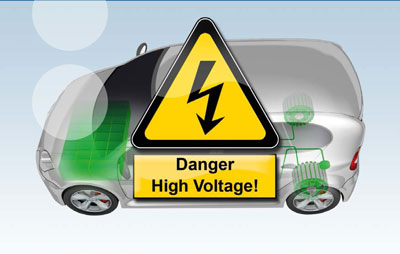Training for work on vehicles with high voltage systems
(bisher: BGI/GUV-I 8686 E)
Information
 | DGUV Deutsche Gesetzliche Unfallversicherung Spitzenverband |
|---|
Published in April 2012

| Contents | Section |
|---|---|
| Foreword | |
| Scope | I. |
| Definitions | II. |
| Electrical hazards presented by high voltage on vehicles | III. |
| 1. Electrical work on the HV systems of vehicles | 3.1 |
| 2. Responsibility | 3.2 |
| 3. Risk assessment | 3.3 |
| Training for work in development and manufacture | IV. |
| 1. Qualification stages for work to be performed prior to the start of production | 4.1 |
| 1.1 General | |
| 1.2 Qualification for Stage 1: non-electrical work | |
| 1.3 Qualification for Stage 2: electrical work | |
| 1.4 Qualification for Stage 3: live electrical work | |
| 2. Training for work relating to production and commissioning during the manufacturing process | 4.2 |
| 2.1 Assembly | |
| 2.2 Commissioning following assembly | |
| 2.3 Electrical tests | |
| Training for work on series production vehicles | V. |
| 1. Operation of vehicles | 5.1 |
| 2. Non-electrical work | 5.2 |
| 3. Electrical work | 5.3 |
| 3.1 Service workshops for vehicles with intrinsically safe HV systems, particularly passenger cars | |
| 3.2 Service workshops for vehicles without intrinsically safe HV systems, particularly commercial vehicles | |
| 3.3 Work on live energy storage devices and at test stations | |
| 4. Accident assistance | 5.4 |
| 5. Scrappage | 5.5 |
| Model risk assessment | Annex 1 |
| Flow chart: need for training for work in development, on test rigs (isolated) | Annex 2 |
| Flow chart: need for training for work development, on test rigs (live) | Annex 3 |
| Topics covered by training for persons without prior electrical knowledge but with technical training | Annex 4 |
| Topics covered by training for persons without prior electrical knowledge in the automotive sector | Annex 5 |
| Topics covered by training for skilled electrical persons in the low voltage sector | Annex 6 |
| Flow chart: need for training for service work on vehicles with intrinsically safe HV systems | Annex 7 |
| Topics covered by training for persons with prior electrical knowledge in the automotive sector for work in service workshops on vehicles with intrinsically safe HV systems | Annex 8 |
| Flow chart: need for training for service work on vehicles with non-intrinsically safe HV systems | Annex 9 |
| Model certificate of attendance for persons who have received electrical instruction in inherently safe HV systems in vehicles | Annex 10 |
| Model certificate for an expert in high voltage (HV) vehicle systems for work in service workshops on vehicles with intrinsically safe HV systems | Annex 11 |
| Regulations, codes, literature Authors List of illustrations | Appendix |
Foreword
The growing use of voltages above 30 V AC and 60 V DC in automotive technology owing to fuel cells, hybrid technology and electric vehicles gives rise to an electrical hazard in the form of electric shock and arcing during work on vehicles. This in turn results in a responsibility for the employer to train his employees further such that they are able to assess pending electrical work, identify possible hazards, and define suitable protective measures.
The present informative publication contains instructions for the employer/superior on how, based upon the risk assessment (see Annex 1 for a model risk assessment), the electrical hazards can be identified (red tab) and the need for training determined for work in:
Research and development (green tab)
Service workshops (yellow tab).
This document does not apply to mounted and fixed machinery on vehicles in accordance with the European Machinery Directive such as that fitted to refuse collection vehicles or mounted cranes.
